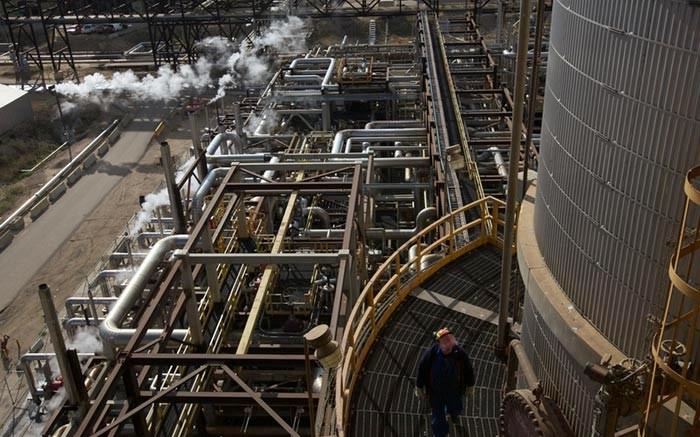Canadian Oil Sands (TSX: COS) management remains on the offensive in the face of a hostile takeover bid from Suncor Energy (TSX: SU; NYSE: SU) that it calls “opportunistic and exploitive.” On Dec. 1, president and CEO Ryan Kubik held a conference call to elaborate on capital spending plans, and tell shareholders that an “independent [Canadian Oil] will deliver more value” than Suncor’s bid.
The company hopes to tailor a story that helps shareholders focus on its potential upside to oil prices, as opposed to the relative security that Suncor might offer. Shares of Canadian Oil are down 62% since June 2014, while Suncor has declined 12%, since the diversity of its business insulates it against collapsing energy markets.
“Obviously [we’re] an asset that is leveraged to the price of crude oil,” Kubik said. “The significant market declines we’ve seen will have a much greater impact on us than Suncor. The same is true on the opposite side of the equation, however, and one of the main reasons shareholders bought the asset is our [strong correlation] and upside to that oil price.”
Canadian Oil’s major asset is a 37% interest in the Syncrude joint venture near Fort McMurray, Alta. Suncor owns 12% in the project, which cranked out 83.2 million barrels of oil through the end of November.
In October Suncor tabled a bid for Canadian Oil that offered shareholders 0.25 of a Suncor share for each share held, which values the deal at $8.83 per share, or $4.3 billion. The offer was set to expire on Dec. 4, before the Alberta Securities Commission gave Canadian Oil shareholders another month to consider it.
The big story at Syncrude is that the ownership group just wrapped up a multi-year, multi-billion dollar capital investment program. In 2016, Canadian Oil estimates its share of total capital expenditures will fall to $295 million, or $8 per barrel. Meanwhile, the project could produce between 95 million and 110 million barrels next year, at US$37 per barrel.
Kubik said that based on US$50 per barrel of West Texas Intermediate (WTI) crude oil, next year Canadian Oil would generate cash flow of $630 million, or $1.30 per share. Assuming WTI prices of US$45 per barrel, the company said it would still cover capital expenses and keep its dividend policy.
“With the major projects behind us, [we’re] in solid shape. Even under lower longer-term oil prices, we have no major projects to fund, and our competitive cost structure provides the basis for generating attractive margins,” Kubik said. “[We] can clearly withstand the prevailing low oil price environment for a sustained period, and Syncrude has demonstrated its flexibility to respond.”
Canadian Oil also said that Suncor’s offer doesn’t capture Syncrude’s value when it comes to undeveloped lease positions and resource bases. Kubik revealed that Suncor and Canadian Oil had been in negotiations over one such asset — labelled “Lease 29” — when the hostile bid was launched. Syncrude has control of leases that “border every oilsands mining project.”
With Lease 29, Suncor could “avoid billions of dollars of sustaining capital required to replace depletion from its North Steepbank mine,” Kubik pointed out. “It also affords Syncrude an opportunity to monetize resource that may not be developed for decades … Suncor is targeting those synergies, and that value is not reflected in the bid.”
Canadian Oil has previously accused Suncor of taking “unfair advantage” of its position as a co-owner in Syncrude by timing its bid to fall in a window where there would be no publicly available information on the joint venture’s 2016 budget, or metrics on enhanced value from the cost-reduction initiatives.
Canadian Oil has traded within a 52-week window of $5.61 to $13.95, and closed at $8.55 per share at press time. The company has 485 million shares outstanding for a $4.1-billion market capitalization.
“We are out running a process to look at available alternatives that could return full and fair value,” Kubik said. “The shareholders we’re talking to believe that an independent Canadian Oil Sands offers more value than the current Suncor offer. We have a business that is torque to the upside when crude oil prices do eventually recover, and a stand-alone [company] is one alternative that is definitely available to us.”


Be the first to comment on "Canadian Oil Sands CEO touts investors’ ‘rich opportunity’"